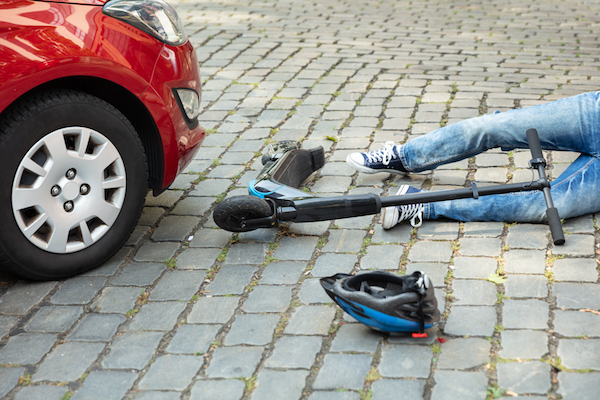E-Scooters

E-Scooter Legislation
E-Scooters are not illegal in their own right. You can purchase, own and ride one on private land as long as you have the landowner's permission. However, you cannot currently ride an e-scooter on the road, pavement, cycle paths or in any other public areas.
Unlike mobility scooters or e-bikes which have their own legislative regimes, there is presently no legislation to support the use of the e-scooters.
Listen to Solicitor, Thomas Mitchell, discussing the lack of legislation around e-scooters in Scotland on Radio Scotland here >>>

E-Scooter Trials
In July 2020, a number of local authorities in England became the first in the UK to trial the use of e-scooters in towns and cities. The trials involved the allowance of rental e-scooters from approved rental companies such as DOTT, LIME or TIER for a period of 12 months. Now that this trial period has come to an end, the question remains as to how the Scottish Government will approach the topic of e-scooters going forward.
E-Scooters and the environment
E-scooters are powered by a battery and therefore generate no emissions compared to those from some diesel and petrol powered vehicles. As e-scooters are great for short journeys (last mile), the introduction of e-scooters to the UK roads will also decrease the amount of unnecessary emissions produced by cars for these types of journeys. The environmental benefits have the potential to be staggering. In London, it is estimated that if all 1 mile car journeys were replaced by e-scooters, there would be a 233 tonne daily reduction in CO2 emissions and improved air pollution.
E-Scooter Safety
If used appropriately with the correct safety precautions,the e-scooter should be just as safe to ride as other two wheeled forms of transport such as a bicycle or e-bike. However, the potential danger arises from the condition of our roads. As e-scooters have much smaller wheels and no real suspension system, road surface defects such as potholes and rutting, especially at the edge of the carriageway, can present a hazard and potential danger for an e-scooter rider.
E-Scooters in other countries
Different legislative systems have been developed around the world to support the use of e-scooters. In Germany, legalised use on roads brings with it both speed and age limit restrictions. In the Netherlands, all e-scooters need to be authorised before they can be used on the roads. In Paris where a number of private hire companies operate, fines ($135) are levied on e-scooter riders who are found to be using the pavements.
E-scooter accidents
If and when legislation allows e-scooters to legally share the road with other road users, then there are inevitably going to be some collisions. Determining where e-scooters sit in the general hierarchy of road users will be interesting, but they will definitely be classed as a vulnerable road users similar to cyclists. Any claim for injury resulting from a collision will depend on the specific circumstances pertaining to the incident.
To learn more about e-scooter please visit our EV law website